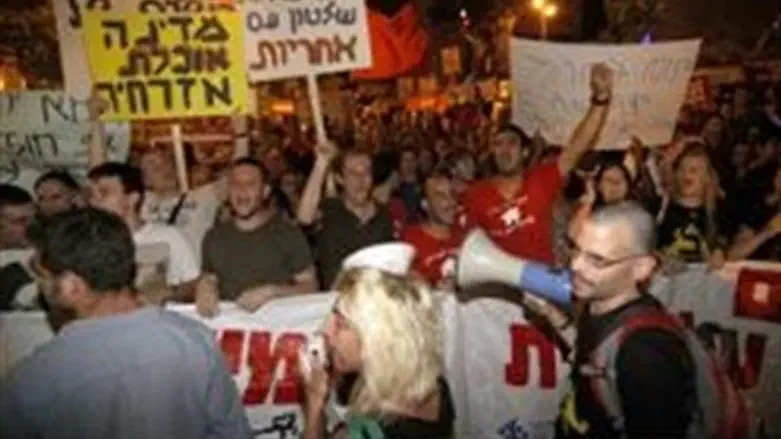
For the fourth straight week, masses of students, union members, government workers, and ordinary Israelis massed in central Tel Aviv to demand a more affordable cost of living. And this week's protest was the largest yet; estimates of the number of those in attendance ranged from 150,000 to over 300,000, which may be gross exaggerations judging by the skewed numbers published last week.
Israel's three main TV channels – 1, 2, and 10 – who have been supporting the protests, suspended regular broadcasts in order to broadcast the event.
For the first time, observers and commentators said that the nature of the rally had taken on a more balanced character, with television analysts shooting down attempts by Kadima leaders to co-opt the issue of “social justice,” the call for which has turned into a rallying cry for the demonstrating masses.
Another change was that representatives of the religious sector were also featured speakers at the rally, with Rabbi Benny Lau telling the crowd that “the tent of social struggle is big enough to fit both right and left. Two days before Tisha B'Av we must remember the lessons of the destruction of the Temple, of how baseless hatred propelled us into a bitter exile. We are all in this together,” he said.
Demonstrators began massing on Saturday afternoon, hours before the official 9 PM starting time, and police increased their estimates of the number of participants throughout the evening. Demonstrators began massing on Rothschild Boulevard and at about 8 PM, began marching towards the Kirya government office district in central Tel Aviv, where speakers and artists regaled the crowd with calls for social change and a redistribution of resources to help the middle class.
Rallies were being in other cities as well, with about 20,000 demonstrating in Jerusalem, and several thousand in the north.
Several of the speakers at the main rally in Tel Aviv took pains to point out that they were not necessarily seeking political change. Itzik Shmuely, chairman of the Israel Students' Union, said that “we are not seeking a change in the parliament that the nation has chosen. We are seeking a change in the harsh economic system that operates in Israel. We demand an economy that is humane, that does not seek to crush us. We demand an economy that looks at the needs of the people, not just at the numbers. We demand a better balance between a free economy and an economy that cares about people,” he said.
Kadima head Tsipi Livni appeared on Channel Two, trying to make political hay, saying that the protests were the result of Prime Minister Binyamin Netanyahu's policies. “The people who are demonstrating want to live normal lives, and they have not been able to do so since the current government took office.” However, she was immediately questioned by her hosts as to what exactly Kadima had done differently when it was in power.
MK Nachman Shai tried to make the same points on Channel 1, and was immediately taken to task by the station's economic commentator, Oded Shachar, who said that Kadima could complain all it wanted to now, but that it had performed even worse than Netanyahu's government when Ehud Olmert and Tsipi Livni were in charge. “You built even less than Netanyahu and the social gap grew at an even faster pace,” Shachar said.
One thing that all the commentators agreed upon – including Likud MK Carmel Shama, chairman of the Knesset Economics Committee -was that at this point it was impossible to attribute the demonstrations to mere partisan politics. “No party or group could get together 300,000 people like this,” said Shama. “This is a spontaneous demonstration and it has gone far beyond politics. The government has been paying attention and is determined to bring about the necessary changes. At this point there can be no ignoring these rallies.”
With that, Shama said, change needed to come about in a responsible manner. “We should take an example from the United States,” he said. “The lowering of America's credit rating is going to have a major, negative impact on the economy. We will see in the coming days just how valuable a credit rating is. Israel is today in great economic shape, with one of the strongest economies in the West. While we must bring about change, we cannot – and must not – compromise those strengths.”